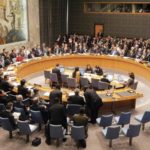 India’s abstention on Security Council Resolution 1973 approving ‘no-fly zone’ over Libya and authorizing all necessary measures to protect civilians has disappointed India’s supporters and reinvigorated the critics. It is alleged that an ‘emerged’ India has still not come out of the diplomatic closet. It was expected that India would use the opportunity as non-permanent member of the Security Council to play a more active role on the international stage. The abstention is viewed as weakening India’s claim for permanent membership; permanent membership is of little value if India is not able to articulate clear positions on critical international issues. Most of the criticism is based on analysis that interprets aggressiveness as a show of responsibility. On the contrary, India has taken a position on the Libyan issue and has avoided the carrot of permanent membership from coloring its judgement. Four aspects require clarification to comprehend India’s position.
India’s abstention on Security Council Resolution 1973 approving ‘no-fly zone’ over Libya and authorizing all necessary measures to protect civilians has disappointed India’s supporters and reinvigorated the critics. It is alleged that an ‘emerged’ India has still not come out of the diplomatic closet. It was expected that India would use the opportunity as non-permanent member of the Security Council to play a more active role on the international stage. The abstention is viewed as weakening India’s claim for permanent membership; permanent membership is of little value if India is not able to articulate clear positions on critical international issues. Most of the criticism is based on analysis that interprets aggressiveness as a show of responsibility. On the contrary, India has taken a position on the Libyan issue and has avoided the carrot of permanent membership from coloring its judgement. Four aspects require clarification to comprehend India’s position.
First, abstention is not ‘sitting on the fence’ syndrome. ‘Sitting on the fence’ would imply that India is unsure of its decision and is waiting to join the side that proves to be stronger or more credible. In this case it is unlikely for India to change its opposition to the use of force by the international community or violent measures of the Gaddafi regime. India’s abstention emerges less from opportunism and more from pragmatism.
Second, abstention is poor evidence to prove India’s lack of leadership in instances where democratic freedoms are threatened. I have already discussed in an earlier post India’s support for democratic values, sans the missionary zeal to promote democratic regimes. Throughout the crisis India has expressed its ‘grave concern for continuing violence, strife and deteriorating humanitarian situation in Libya.’ However, in the choice between national sovereignty and democracy, India continues to accord primacy to the former. India’s doctrine of non-intervention may be open to criticism but there is no guarantee that decision to intervene will be widely supported. Thus, it is better for India not to be swayed by how others define and measure leadership.
Third, India’s explanation of the decision requires some credit. According to India’s Ambassador to U.N. Manjeev Singh Puri, the resolution is backed by “little credible information on the situation on the ground in Libya.” The Security Council was awaiting reports from the Secretary General’s Special Envoy and African Union’s High Level Panel when the decision to impose the ‘no-fly zone’ was reached. Moreover, in India’s assessment the proposed measures were likely to “exacerbate an already difficult situation for the people of Libya.” India favors addressing the Libyan situation through political measures rather than use of force. Again, the usefulness of political measures is open to question but so is the utility of military tools. India is not questioning the intentions behind the decision to impose the ‘non-fly zone’ but is concerned about the implementation and outcome of the decision.
Finally, the decision was influenced by the strategic restraint principle of India’s foreign policy. Analysts refer to the upcoming elections in West Bengal, Kerala and Assam to explain India’s decision as a measure by the UPA government to appease the Muslim vote. International observers view India’s support for the principle of non-intervention as an approach to check involvement of the international community in the dispute of Kashmir. However, tradition of strategic restraint, elaborated by Sunil Dasgupta and Stephen P. Cohen in The Washington Quarterly article better explains the rationale behind India’s decision. According to Dasgupta and Cohen, “one of the most remarkable attributes of India as an independent state has been its reticence to use force as an instrument of policy.” India’s preference for restraint, exhibited in the country’s various foreign policy decisions also informs its wider international role.